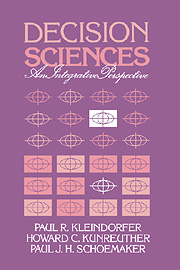1 - The scope of decision sciences
Published online by Cambridge University Press: 05 June 2012
Summary
Introduction
The emerging field of decision sciences is concerned with understanding and improving decision making of individuals, groups, and organizations. At issue is not only how decision makers “solve problems,” but also how they came to identify and accept such problems and learn from the results of their actions.
Decision making may be defined as intentional and reflective choice in response to perceived needs. Anthropologists such as Pierre Teilhard de Chardin (1959) consider this ability to reflect and choose as the fundamental characteristic distinguishing man from lower forms of life. While the recognition of this ability may provide the reader with a momentary feeling of superiority, history is also replete with examples of human limitations in decision making. Our purpose in this book is to provide a basis for understanding these limitations as they relate to individual, organizational, and societal decision processes and to use this basis to provide insights as to how such decision processes might be improved.
The dilemmas of choice in the face of an uncertain and complex world have long been the focus of religion, literature, and philosophy. In Western literature, classical epic poems and tragedies depict the gradual evolution of human choice from a metaphorical extension of the will of gods in Homer's epics to the realm of willful, if not always rational, choice in Euripides' tragedies. Writers such as Friedrich Nietzsche and Julian Jaynes have described this emergence during the first millennium B.C. from ritual and metaphor to willful action and reflective choice as a matter of the utmost importance in Western culture.
- Type
- Chapter
- Information
- Decision SciencesAn Integrative Perspective, pp. 3 - 23Publisher: Cambridge University PressPrint publication year: 1993
- 1
- Cited by

